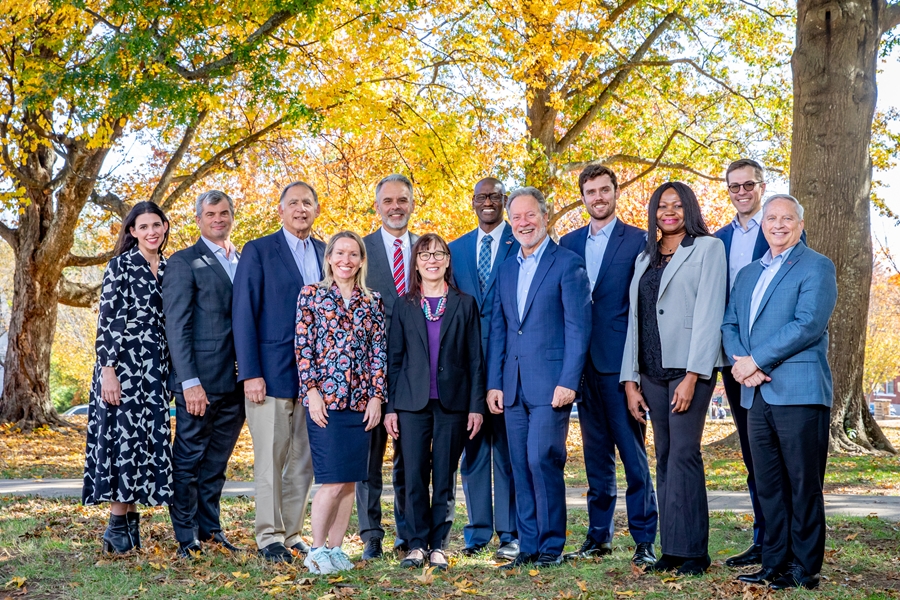
The executive director of the United Nations World Food Programme, David Beasley, made a visit to the U of A campus last week, meeting with campus leaders and students to provide his insight on global food security.
Beasley was joined on his visit by U.S. Sen. John Boozman (R-Ark.), who serves as the top Republican on the Senate Committee on Agriculture, Nutrition and Forestry.
Both leaders met with multiple members of campus administration including interim Chancellor Charles Robinson, before visiting the Global Perspectives on Food Security class in the School of Law to meet with masters students in the LL.M. Program in Agricultural and Food Law and juris doctor students.
The World Food Programme, which was named the Nobel Peace Prize Laureate in 2020, is the world’s largest humanitarian organization addressing hunger and promoting food security.
In 2019, alone, the World Food Programme provided assistance to nearly 100 million people in 88 countries who were victims of acute food insecurity and hunger. WFP’s efforts focus on emergency assistance, relief and rehabilitation, development aid and special operations. Two-thirds of its work is in conflict-affected countries where people are three times more likely to be undernourished than those living in countries without conflict.
Beasley’s discussion with students was facilitated by Susan Schneider, the Enfield Professor of Law and director of the LL.M. Program in Agricultural and Food Law, as Beasley provided his first-hand expertise and insight on the World Food Programme, its mission to end hunger, improve food security and improve nutrition by 2030.
The LL.M. Program in Agricultural and Food Law at the U of A School of Law was the first of its kind when it was founded over 40 years ago. Today, it continues to lead the nation in this important area of law, connecting lawyers to our food system, from farm to plate.
Along with providing an exceptional agricultural and food law curriculum designed specifically for LL.M. students, the School of Law also publishes the Journal of Food Law & Policy, is home to the nationally acclaimed Indigenous Food and Agriculture Initiative and provides outreach and experiential opportunities through the Food and Agriculture Impact Project.
More About David Beasley
Before coming to the World Food Programme in April 2017, Beasley spent a decade working with high profile leaders and on-the-ground program managers in more than 100 countries, directing projects designed to foster peace, reconciliation and economic progress. He travelled to as many as 30 countries a year, organizing, leading or participating in conferences and missions in Kosovo, South Sudan, Sudan, Tunisia and Yemen, among others. His work has allowed him to develop deep relationships with leaders around the world.
As governor of South Carolina from 1995 to 1999, Beasley guided the state during years of economic transformation, helping to reshape the state’s economy into a healthy, diverse and robust market. The work led to one of the lowest unemployment rates in the country, with a dramatic increase in private sector capital investment.
Beasley was the first governor in South Carolina to make a public push for the removal of the Confederate battle flag from the state Capitol dome, a move that earned him the John F. Kennedy Profile in Courage Award.
About the University of Arkansas: As Arkansas' flagship institution, the U of A provides an internationally competitive education in more than 200 academic programs. Founded in 1871, the U of A contributes more than $2.2 billion to Arkansas’ economy through the teaching of new knowledge and skills, entrepreneurship and job development, discovery through research and creative activity while also providing training for professional disciplines. The Carnegie Foundation classifies the U of A among the few U.S. colleges and universities with the highest level of research activity. U.S. News & World Report ranks the U of A among the top public universities in the nation. See how the U of A works to build a better world at Arkansas Research News.
Topics
Contacts
John Thomas, director of media relations
University Relations
479-575-7430,
jfthomas@uark.edu